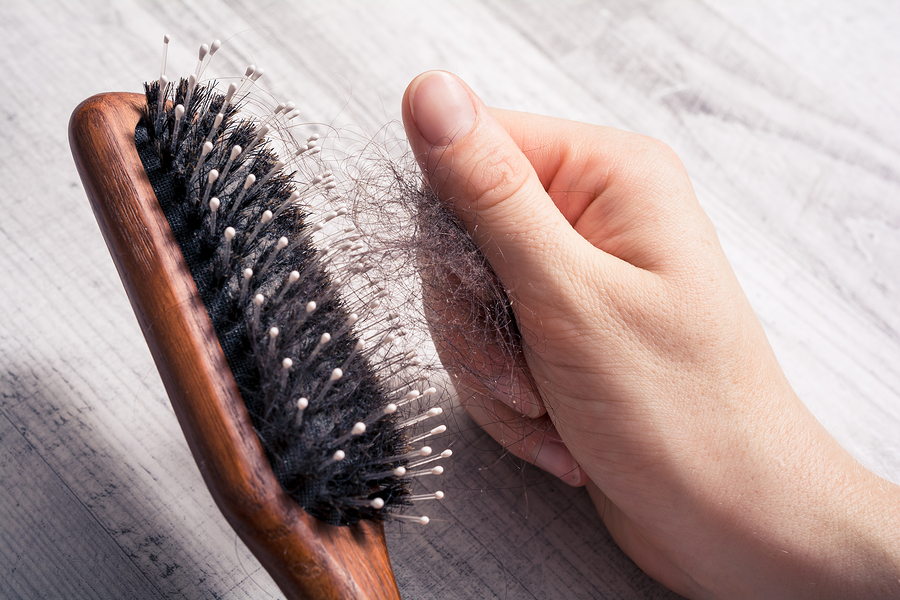Four things that could be causing your thinning hair
Hair loss can be deeply upsetting for women. Here’s what causes it, and how to treat it
Female hair loss may be shrouded in shame and secrecy, but it’s incredibly common. Up to eight million UK women are affected, many of us suffering in silence. And in the worst cases, it can be devastating. ‘There’s a stigma for women especially, because it can feel like you’ve lost part of your identity,’ says trichologist Iain Sallis, specialist in hair loss and founder of the Hairmedic Trichology clinic (hairmedic.co.uk). ‘Healthy hair denotes vitality and youth.’ Add in the fact that doctors don’t always take hair loss seriously, and it’s the perfect storm for women to be left feeling alone and embarrassed.
When should you be concerned?
Losing some hair is normal, so if there’s a web in your brush, don’t panic – we typically shed 50-100 strands daily. But if you’ve noticed bald spots, or your mane is generally sparser, you may need help. ‘If your clothes are covered, or strands keep coming away, that’s a problem,’ says Sally-Ann Tarver, consultant trichologist at the Cotswold Trichology Centre (cots-tri.co.uk). Luckily, there’s hope. ‘In 90% of cases, hair loss can be treated,’ says Sallis.
Crucial is pinpointing the problem. First see your GP, who can refer you for blood tests, or a dermatologist (they treat hair, too). You can also see a trichologist privately (see trichologists.org.uk).
The following are all possible causes.
The trigger: nutritional causes
Hair loss can be a symptom of low vitamin B12, which is needed for new hair cells; or low vitamin D, which is thought to help follicles grow. Getting enough protein is vital, too – after all, your hair is made from it. ‘Sulphur-rich amino acids are important, especially methionine, found in meat, fish and eggs,’ says Sallis. If you’re plant-based, try tofu, nuts or quinoa. And watch your alcohol – excess boozing is linked with every deficiency going. Unsurprisingly, extreme and rapid weight loss from crash diets goes hand-in-hand with nutritional deficiencies. Starve your body and it enters crisis mode – hair is non-essential, so back of the queue for nutrients. As a result, hair can be forced into its resting phase prematurely.
The treatment
‘You can rule out deficiencies with a blood test,’ says Sallis. ‘Take the right supplements, and hair usually bounces back quite easily.’ But give it time. ‘Hair takes six months to respond to any treatment,’ says Sallis. In general, follow a balanced diet, and if you’re plant-based, make sure you get enough iron-rich foods, such as green leafy veg.
The trigger: stress
‘Stress increases cortisol levels,’ says Tarver. ‘This can cause a percentage of hair to enter its resting phase earlier.’ And as losing hair is itself stressful, this can compound things. Telogen effluvium is when entering the resting phase prematurely causes diffuse thinning across the scalp – it often occurs three months after a trauma. In some, stress can trigger alopecia areata, which causes bald patches, and can be permanent. Sallis explains: ‘Alopecia areata is an autoimmune disorder, where the body attacks itself in the follicles.’ However, Sallis believes stress as a trigger is overstated. ‘Acute stress at specific times can cause loss – a bereavement, a car accident. But, in my experience, day-to-day stress doesn’t.’
The treatment
‘You can’t really treat an autoimmune problem like alopecia,’ says Sallis. ‘However, things like minoxidil [available over the counter from chemists] or topical steroid creams, may help.’ Prescription steroids and corticosteroid injections are other options. Hair usually recovers from telogen effluvium within 3-6 months. For longer-term stress-induced loss, there’s no magic pill, says Tarver. ‘If you’re in a stressful situation, at work or in a relationship, you should sort that out first.’ Don’t fret about things like over-washing though. ‘Washing, colouring, combing – none of these make a blind bit of difference,’ says Sallis.
The trigger: undiagnosed illness
‘Hair is a barometer of health,’ says Sallis. And occasionally thinning can be a symptom of an underlying condition, such as an underactive thyroid. ‘The hormone thyroxine is important for metabolism. If you don’t have enough, cells don’t have enough energy to grow, including follicles.’ Other possible causes include diabetes, the autoimmune disorder lupus, and coeliac disease.
The treatment
‘Diagnosis is a process of elimination, looking at pattern of loss, how long it’s gone on for, diet, age and so on,’ says Tarver. In most cases, thinning presents alongside other symptoms. Don’t be scared to press your doctor for answers. Lacklustre locks can be a side-effect of some medications, including the antidepressant Prozac (fluoxetine). Discuss alternatives with your GP if you think your medication is a factor.’
The trigger: menopause
Post-menopause hormone changes can send hair into turmoil. ‘Women suffer from genetic loss in the same way as men. It’s just milder and starts at an older age,’ says Sallis. Shifting hormone levels lead to DHT, an androgen (male hormone), binding to receptors in sensitive follicles. These then shrink, producing weedier hairs, and reducing volume.
The treatment
‘There are two options,’ says Tarver. ‘One is minoxidil.’ The other is a laser helmet, called the Theradome. ‘This also increases blood flow to follicles. It’s safe, can be used at any age, and is compatible with a large proportion of medications.’ Some research has shown that caffeine can stimulate hair follicle growth in lab conditions, though the jury is out on whether caffeine shampoos can make any real difference. If you’re feeling self-conscious, hair concealers can provide a temporary fix.
Find more great health, lifestyle and fitness content in healthy magazine and at healthy-magazine.co.uk
By Cheryl Freedman/ Healthy magazine
Latest posts by healthy Magazine (see all)
- The five best easy moves to stay fit at any age - June 28, 2021
- How to have glowing skin in your 50s - June 1, 2021
- Should you be eating more plant-based? - May 5, 2021
- Four things that could be causing your thinning hair - March 29, 2021
- What type of headache do you have? - March 1, 2021




















